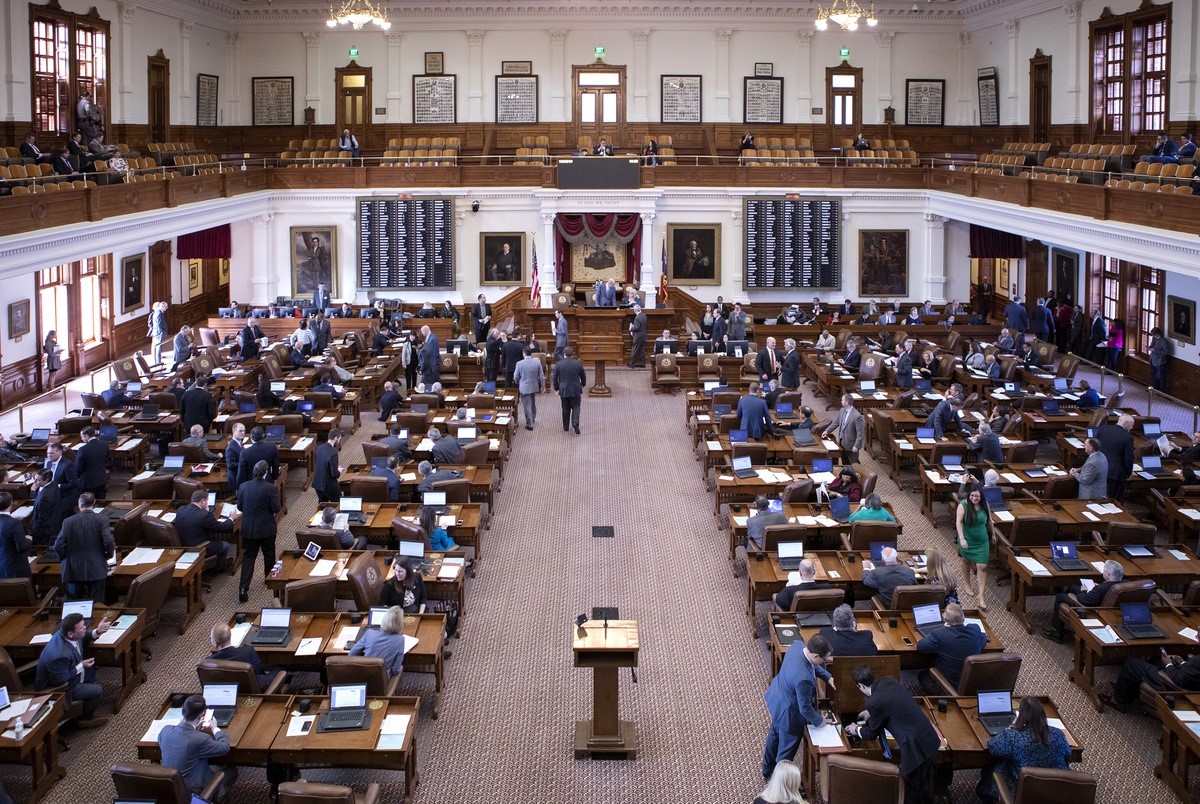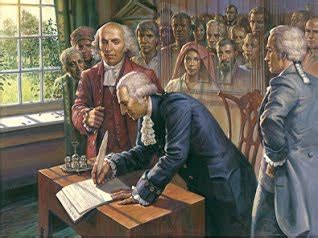
Where’s The Line, America? Part I
How States Protect The Constitution
By Ken Ivory – 2011
[The following are excerpts from Utah Representative Ken Ivory’s book, Where’s The Line, on how states protect the Constitution with thoughts from the Framers themselves. Part II will illustrate the “few and defined” powers of Congress and States.]
Constitutionally, State Legislatures were entrusted with resisting every federal usurpation better “Than Any Other Power On Earth Can Do.”
James Madison summarized this principle in these words:
“[T]he State Legislatures will jealously and closely watch the operations of this Government, and be able to resist with more effect every assumption of power, than any other power on earth can do; and the greatest opponents to a Federal Government admit the State Legislatures to be sure guardians of the people’s liberty.” – James Madison
More than anything, it was the inability to come to terms on a system of divided sovereignty that led to the total separation and declaration of independence of the Colonies from Great Britain.
As much as anything (if not more so), it was the establishment of this constitutional line, this innovative system of divided sovereignty between the states and the federal government—the genius of this compound republic—that unleashed and secured the laws of liberty, the principles of prosperity, and the pillars of peace to the people of the several states in this new United States of America.
Jefferson added regarding the imperative duty of the states in the operation and maintenance of this distinctive compound republic:
“I am for preserving to the States the powers not yielded by them to the Union, and to the legislature of the Union its constitutional share in the division of powers; and I am not for transferring all the powers of the States to the General Government, and all those of that government to the executive branch.
The support of the State governments in all their rights, as the most competent administrations for our domestic concerns and the surest bulwarks against antirepublican tendencies, I deem [one of] the essential principles of our Government, and consequently [one of] those which ought to shape its administration.” –Thomas Jefferson, 1st Inaugural Address, 1801
Samuel Adams (the “Father of the Revolution”) affirmed that the sovereignty and jurisdiction of the states is not merely a matter of political jealousy, but is the indispensable linchpin for preserving a republican form of government over such a wide expanse of people and territory:
“I was particularly afraid that unless great care should be taken to prevent it, the Constitution in the Administration of it would gradually, but swiftly and imperceptibly run into a consolidated Government pervading and legislating through all the States, not for federal purposes only as it professes, but in all cases whatsoever: such a government would soon totally annihilate the sovereignty of the several states so necessary to the support of the confederated commonwealth, and sink both in despotism.”
If the States allow the federal government to ignore the Constitutional Line by interfering in the States’ jurisdictions, “It Will be [the States’] Own Faults.”
John Dickinson warned that the states are empowered and duty-bound to prevent the federal government from interfering in the states’ sphere of responsibility:
“In short, the government of each state is, and is to be, sovereign and supreme in all matters that relate to each state only. It is to be subordinate barely in those matters that relate to the whole; and IT WILL BE THEIR OWN FAULTS, if the several states suffer the federal sovereignty to interfere in the things of their respective jurisdictions.” –John Dickinson (Fabio’s), Letter III, 1788 (emphasis added, all caps emphasis in original)

The Founders viewed the power and responsibility of the States to preserve and maintain their sovereignty as similar to their power and responsibility to repel “The Dread of a Foreign Yoke.”
Madison urged ratification of the Constitution by assuring the public that under the proposed Constitution states would retain the power and the duty to preserve the balance of power between the states and the federal government:
“But ambitious encroachments of the federal government, on the authority of the state governments, would not excite the opposition of a single state or of a few states only. They would be signals of general alarm. Every government would espouse the common cause. A correspondence would be opened. Plans of resistance would be concerted. One spirit would animate and conduct the whole. The same combinations in short would result from an apprehension of the federal, as was produced by the dread of a foreign yoke; and unless the projected innovations should be voluntarily renounced, the same appeal to a trial of force would be made in the one case, as was made in the other.” – Federalist 46, 1788 (emphasis added)
The Constitutional Line
As emphasized previously, it is the constitutional duty of the states to “erect such barriers at the constitutional line as cannot be surmounted either by themselves or by the General Government.” Thomas Jefferson defined this “constitutional line” drawn by the Founders in the following unmistakable terms:

“I consider the foundation of the Constitution as laid on this ground: That “all powers not delegated to the United States, by the Constitution, nor prohibited by it to the States, are reserved to the States or to the people” [10th Amendment]. To take a single step beyond the boundaries thus specifically drawn around the powers of congress is to take possession of a boundless field of power, no longer susceptible of any definition.” – Thomas Jefferson: National Bank Opinion, 1791 (emphasis added)
On one side of the Constitutional Line are the powers delegated to the federal government by the Constitution. On the other side are reserved to the States or to the People all other powers not delegated to the federal government (excluding only those few that the Constitution specifically prohibits to the States).
The Founders rejected any “metaphysical” “metamorphosis of the Constitution into a character which . . . was not contemplated by its creators” (Madison), whether by means of strained readings of the General Welfare, Necessary and Proper, or Commerce Clauses— or of any other constitutional provision.
“If Congress can employ money indefinitely to the general welfare, and are the sole and supreme judges of the general welfare, they may take the care of religion into their own hands; they may appoint teachers in every state, county and parish and pay them out of their public treasury; they may take into their own hands the education of children, establishing in like manner schools throughout the union; they may assume the provision of the poor; they may undertake the regulation of all roads other than post-roads; in short, everything, from the highest object of state legislation down to the most minute object of police, would be thrown under the power of Congress … were the power of congress to be established in the latitude contended for, it would subvert the very foundations, and transmute the very nature of the limited government established by the people of America.” –James Madison, First U.S. Congress Floor Debate, 1792 (emphasis added)
“With respect to the words “general welfare,” I have always regarded them as qualified by the detail of powers connected with them. To take them in a literal and unlimited sense would be a metamorphosis of the Constitution into a character which there is a host of proofs was not contemplated by its creators.”
– James Madison, Letter to James Robertson, 1831 (emphasis added)
“I cannot undertake to lay my finger upon an article of the Constitution which granted a right to Congress of expending, on the objects of benevolence, the money of their constituents.” –James Madison, Annals of Congress, 3rd Congress, 170, 1794
“Congress has not unlimited powers to provide for the general welfare, but only those specifically enumerated.” –Thomas Jefferson, Letter to Albert Gallatin, 1817
There is a palpable, and largely non-partisan, sense of the nationwide angst about a federal government devoid of budgetary balance and governmental proportionality. This national discontent cries out for the states to take a concerted and definitive stand in carrying out the fundamental, constitutional duties of the states to:
- Be the “sure guardians of the people’s liberty.” (Madison)
- Prevent the federal government “from over passing their constitutional limits.” (Hamilton)
- “Erect barriers at the constitutional line as cannot be surmounted either by themselves or by the General Government.” (Jefferson)
- “Jealously and closely watch the [federal] government, and be able to resist … every assumption of power, [better] than any other power on earth can do.” (Madison)
- And, as Framer John Dickinson said, “IT WILL BE THEIR OWN FAULTS, if the several states suffer the federal sovereignty to interfere in the things of their respective jurisdictions.” (capital emphasis original)
[There is] a pressing need for the resolve to maintain the rights inherited from our Fathers for the sake of our Children. The biggest issues that face us today are not fundamentally left or right, liberal or conservative; they are jurisdictional and systemic. It’s “Where to Decide” before tackling “What to Decide;” it’s the unique genius of our constitutional system of divided sovereignty—our compound republic—where “the two governments (states and federal) will control each other” and prevent each other from “over passing their constitutional limits.”
From the book, Where’s the Line? How States Protect the Constitution by Ken Ivory-2011; second edition.
info@Wheres’TheLineAmerica.com
[Ed: The question is, how do we the people return to the Laws of Nature and of Nature’s Creator and finally, to the Consent of the Governed? See Part II.]
